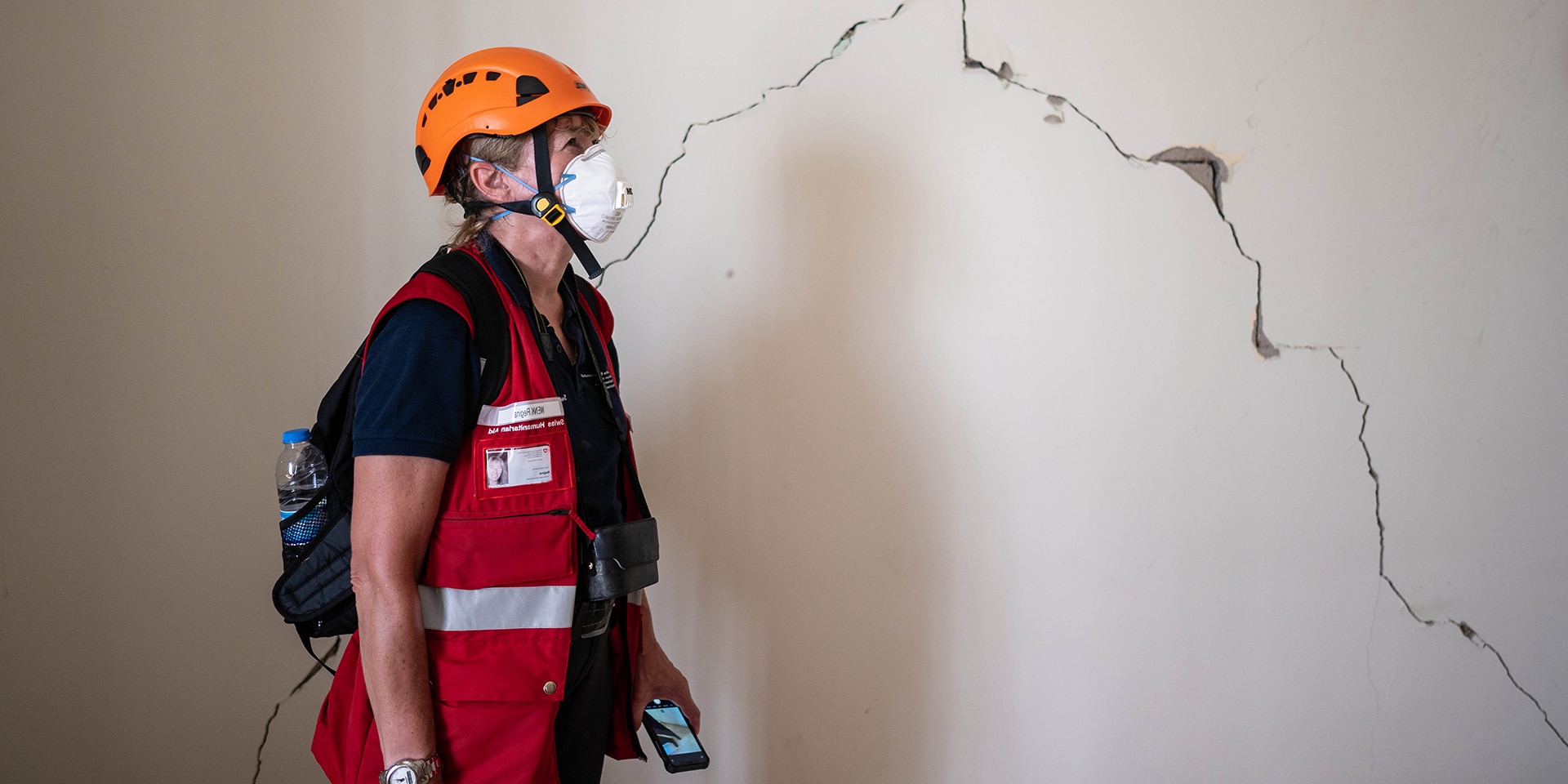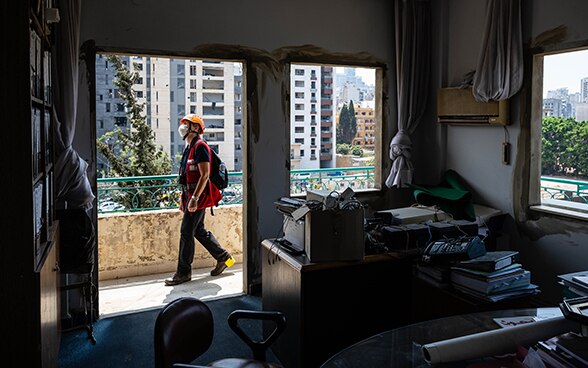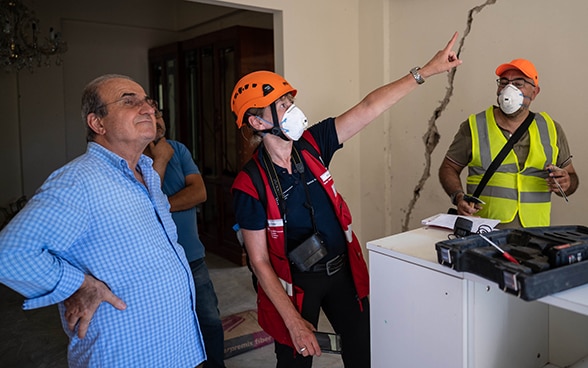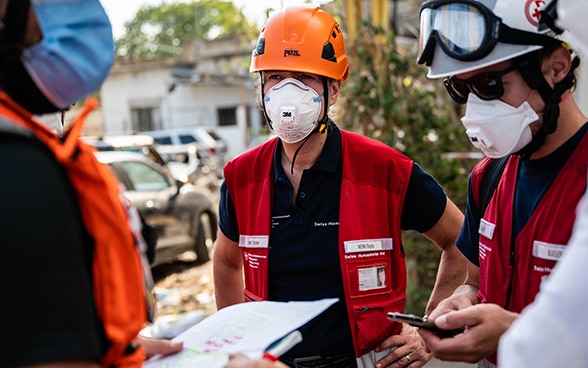Experts on the ground in Beirut: interview with structural engineer Regina Wenk
Several teams from the Swiss Humanitarian Aid Unit have been working in Beirut for several days now. Structural engineer Regina Wenk was part of the first team sent out. Having previously worked in many disaster-hit areas, she is well used to entering buildings that have suffered extensive damage. After her inspection, the occupants at least know whether they can safely return home or have to evacuate the building.

During her mission in Beirut, engineer Regina Wenk examines whether cracks in the wall endanger the stability of the building. © FDFA
Regina Wenk, can you tell us how you prepared for this mission?
Regina Wenk: I saw the explosion on the news. Swiss Humanitarian Aid contacted me shortly afterwards to see if I was available to go to Lebanon. As it's the summer holiday period, it was easy enough for me to arrange leave with my employer. I confirmed I was available and went to Bern the next day for a medical check-up and a COVID-19 test. That evening I was called to a crisis unit briefing at the head office of Swiss Humanitarian Aid. Then I went home to Aarau to pack my things, and the next day I left for Beirut.
Once you got to Beirut, how did you start your mission?
After landing, we headed straight for the Swiss embassy. The building was close to the explosion site. It was badly damaged and all the windows were broken. The blast was so powerful that debris had got stuck in the walls. Power cables were dangling everywhere, doors were lying on the floor and there was a lot of rubble.
I was one of two structural engineers, and our first task was to check that the basic structure of this 15-storey building was sound. Then we ran the same checks on the buildings where embassy staff were living. It turned out that none of the sites we inspected were at risk of collapse. This news came as a great relief to the occupants, who were already traumatised by the disaster.
What is the role of structural engineers here?
We check the stability of buildings after an earthquake or cyclone or, as in this case, an explosion. Survivors are usually afraid to enter their homes for fear of the building collapsing. If there is no structural damage, we can tell these people that their homes are safe and they don't have to fear for their lives. However, if we find any cracks, we tell the authorities so the occupants can evacuate the building.
Our expertise is also of use to rescue teams who have to work in badly damaged buildings that could collapse at any time.

So how is the situation in Beirut? Have you found a lot of damage?
Yes, there is a lot of damage, but most buildings are not at risk of collapse. The old sandstone houses are badly damaged. The entire area around the harbour was razed to the ground, so there's nothing left to inspect there. Some of the big warehouses are completely unrecognisable. In our job, we distinguish between three categories of building: destroyed, damaged but repairable, and intact.
The destruction caused by the explosion is similar to that of an earthquake. But there are no aftershocks with an explosion, so that makes our work easier. When we inspect a site here in Beirut, we know that our findings are not going to change. It's different in the case of an earthquake, where we have to inspect the same building several times on account of the aftershocks.
Can you describe your working day in Lebanon?
Every day the Lebanese authorities assign us a particular area to be inspected. This ensures a degree of coordination among the various teams working on the ground. We see a lot of Lebanese and international engineers working in the zones affected by the explosion. At the end of the day we compile our data and share it with the Lebanese authorities.

How many buildings have you inspected? Were there any buildings that had to be evacuated?
In three days we inspected over 80 buildings, mostly rental properties. We also inspected the structure of a few hospitals. Swiss Humanitarian Aid is assisting a hospital in Beirut in caring for pregnant women and children. So we inspected this site to make sure there was no risk in providing this aid.
Our role is to carry out the inspections. We then pass on our findings to the relevant authorities, and it's their job to talk to the families concerned if the building has to be evacuated.

Who are you working with there?
Our inspections are always in teams of two, with one person checking the other person's findings. Apart from my colleague from the Swiss Humanitarian Aid Unit, we also have a local engineer working with us. It's very useful having him on board because he can tell us a lot about Lebanese building standards.
What made you decide to go on this mission?
We've seen a lot of blood while inspecting people's apartments. There have been some very serious injuries from broken windows and flying debris. You simply cannot be indifferent to such scenes. I find this very moving, and I can well imagine the horror these people felt.
On a more positive note, we witnessed a huge outpouring of solidarity in the streets. People helping others with food or medical attention. And handing out clothes. I've also seen many young people helping to clear up the rubble in their neighbourhoods. Many Lebanese are opening their doors to those who haven't a roof over their heads. This sort of thing is very uplifting to see.
